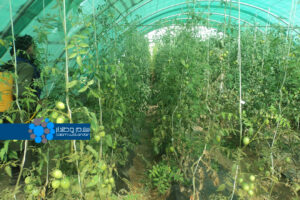FAYZABAD CITY (SW) – Farmers in Badakhshan are facing serious challenges with crop yields of wheat and barley significantly declining this year.
Many farmers attribute this instability to various factors affecting their rain-fed fields, leading to a growing concern among the farming community.
Wajehuddin, a local farmer, said that this year’s harvest is much lower than in previous years. He attributes this decline to the lack of quality seeds and fertilizers, emphasizing the need for support and attention from authorities to address their issues.
“I have five jeribs of irrigated land and about 25 jeribs of rain-fed land where we plant wheat and barley. Compared to the past year, our yields have decreased due to the unavailability of chemical fertilizers and the poor quality of seeds,” he said.
Another farmer, Rawzatullah, from Tishkan district, also reported a significant reduction in his harvest this year. He pointed to natural factors and insufficient rainfall as contributors to the decline in quality of his crops.
He complained about the inattention from the Badakhshan Agriculture, Irrigation and Livestock Directorate, saying, “Village leaders have approached the agriculture directorate multiple times seeking quality seeds and better fertilizers, but unfortunately, they have received nothing, and we are left in a state of confusion as our yields continue to decline each year.”
Wasiqullah, another farmer, shared insights about planting in rain-fed fields: “We do not plant many crops in our rain-fed lands; we primarily cultivate wheat, and in colder regions, we plant barley. In some areas, we do not cultivate much, as we primarily cultivate some crops to use it for livestock feed.”
Abdul Basir Yonusi, an agricultural expert in Badakhshan, explained that due to the mountainous terrain, most farmers engage in rain-fed agriculture. He commented on the complaints regarding unstable yields, stating, “Farmers who complain about instability often do not maintain their fields properly. Every year, planting only wheat depletes the soil’s structure and quality, leading to a loss of its organic properties.””
Farmers who complain about instability are not properly managing their land. Year after year, they plant wheat, which damages the soil’s structure, texture, and quality. Continually planting wheat depletes the soil’s organic matter and stability. The chemical fertilizers used unfortunately do not maintain the land in a sustainable or standard condition.”
Meanwhile, Ehsanullah Seraji, the head of agricultural affairs at the Badakhshan Department of Agriculture, Irrigation, and Livestock, acknowledged that weather conditions significantly impact crop yields. He noted that years of heavy or low rainfall could drastically affect both the quality and quantity of produce. “The instability refers to the dependency of rain-fed agriculture on climatic conditions. Rain during the necessary periods can have both positive and negative effects on their yields,” he explained.
Located in northeastern Afghanistan, Badakhshan is one of the country’s mountainous and cold provinces, facing ongoing agricultural challenges. Farmers here primarily rely on rain-fed agriculture for their livelihoods, but in recent years, the instability of their crop yields has become a serious issue.






